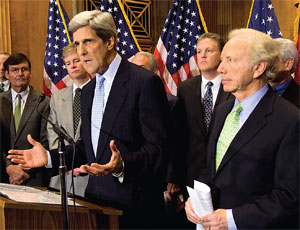While a variety of groups from utilities to environmental organizations are clamoring for a climate-change bill that can pass the Senate, construction industry sources say prospects for the bill—rolled out on May 12 by Sens. John Kerry (D-Mass.) and Joe Lieberman (I- Conn.)—look slim. They unveiled the 987-page American Power Act without the support of Lindsey Graham (R-S.C.), who had worked with Kerry and Lieberman for several months to craft a bipartisan bill but who in recent weeks dropped out of the discussions.

Firms that work in the power sector and utilities say a bill like the Kerry-Lieberman package is needed to create more certainty in a market that in recent years has been plagued with a great deal of uncertainty over the looming threat of carbon regulation. But without a single Republican supporting the bill and some Democrats skittish about voting for any bill that would permit offshore drilling, industry sources are skeptical anything can pass this year.
Bill Kemp, vice president for strategy and sustainable services at Overland Park-based Black & Veatch, says, “We have heard from a lot of clients who have held back from making major investments because there was too much uncertainty.” He says greater certainty about “the trajectory of carbon prices would lead to an increased level of investment” in a variety of energy projects.
What’s In It
The bill aims to reduce greenhouse-gas emissions to 17% below 2005 levels by 2020 and then cut them by 80% by 2050. It would set limits beyond which polluters would have the option of trading credits or paying penalties within a fixed price range. The introductory floor would be $12 per ton of carbon dioxide emitted, increasing at 3% above inflation annually to a ceiling of $25 per ton, which also annually rises by 5% above inflation.
Kerry and Lieberman include generous distribution of free greenhouse-gas-emissions allowances to electric utilities and industry, and they phase in the requirements for manufacturers and other industrial sources. Only the largest sources of pollution—those that produce more than 25,000 tons of carbon dioxide annually, which includes about 7,500 factories and powerplants—would be required to comply with reduction targets.
The package also includes broad financial incentives to increase nuclear power generation, including a new investment tax credit to promote the construction of plants, $54 billion in loan guarantees and a manufacturing tax credit to spur the domestic production of nuclear parts. The bill includes support for offshore drilling but would allow states to opt out of drilling for the first 75 miles from their shores. States that pursue drilling would receive funds to help protect their coastlines and coastal ecosystems.
Further, the bill would provide incentives for the development of natural-gas and clean coal technologies as well as renewable sources of energy.
Black & Veatch’s Kemp estimates that carbon prices would hit the mid-$20s within five years, which could accelerate the retirement of about 20% of the approximately 300,000 MW of coal-fired capacity currently in the U.S. Those plants likely would be replaced by single- and combined-cycle natural-gas-fired plants in the near term he says.
While a wide swath of environmental groups, utilities, renewable-energy advocates and industry firms lined up to declare their support for the Kerry-Lieberman bill, some groups see provisions they do not like. The Associated General Contractors and the American Road and Transportation Builders say they are concerned about a provision that would commit only a small percentage of a new transportation fee, raised through an additional fee per barrel of oil, for transportation-related investment. “The legislation leaves our aging and inefficient roads, airways and transit systems vastly underfunded,” says Stephen Sandherr, CEO of the Associated General Contractors.
Whether the legislation can pass is the key question. Sen. Kerry reported that, despite conventional wisdom, “We are closer than ever to a breakthrough.” In the last Congress, 54 senators said they were prepared to vote in favor of a climate bill. Kerry will need to garner 60 votes to be able to muster a floor vote. The House passed its climate-change bill last June.






























Post a comment to this article
Report Abusive Comment